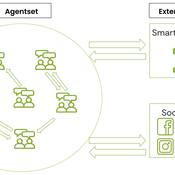
Daria Soboleva
AffiliationsDuke University, Universidad Carlos III de Madrid
Personal homepagehttps://www.linkedin.com/in/daria-a-soboleva-342a3a218/
ORCID more infohttps://orcid.org/0000-0002-2243-8383
GitHub more info
I am currently enrolled as a graduate student at UC3M, working towards a MS degree in Computational and Applied Mathematics. Upon completing my current program, my intention is to further my education in Applied Economics, with a specific focus on the intersection of Climate and Development Economics.
My research pursuits center around investigating the impacts of climate change on developing nations. Additionally, I am interested in studying the repercussions of fast fashion consumption, examining its effects on working conditions, the environment, and the overall well-being of individuals in the countries where these garments are manufactured. In my ongoing master’s thesis, I employ Agent-Based Modeling to simulate the attitudes of individual consumers towards fast fashion. The model captures behavioral shifts influenced by peers, social media, and governmental factors. This research aligns with my broader interests in comprehending public perspectives on global matters, underscoring the crucial influence of individual attitudes in confronting and finding solutions to these challenges.
Research Interests
Development Economics, Environmental Economics, Sustainability, Environment, Climate change, Climate justice, Energy, Clean Energy, Renewable Energy, Complex systems
Peer reviewed Agent-Based Insight into Eco-Choices: Simulating the Fast Fashion Shift
Daria Soboleva Angel Sánchez | Published Wednesday, August 07, 2024 | Last modified Wednesday, June 11, 2025The present model was created and used for the study titled ``Agent-Based Insight into Eco-Choices: Simulating the Fast Fashion Shift.” The model is implemented in the multi-agent programmable environment NetLogo 6.3.0. The model is designed to simulate the behavior and decision-making processes of individuals (agents) in a social network. It focuses on how agents interact with their peers, social media, and government campaigns, specifically regarding their likelihood to purchase fast fashion.
Peer reviewed Behavior changes through influence
Daria Soboleva | Published Friday, August 30, 2024The model is designed to simulate the behavior and decision-making processes of individuals (agents) in a social network. It aims to represent the changes in individual probability to take any action based on changes in attributes. The action is anything that can be reasonably influenced by the three influencing methods implemented in this model: peer pressure, social media, and state campaigns, and for which the user has a decision-making model. The model is implemented in the multi-agent programmable environment NetLogo 6.3.0.
Under development.
